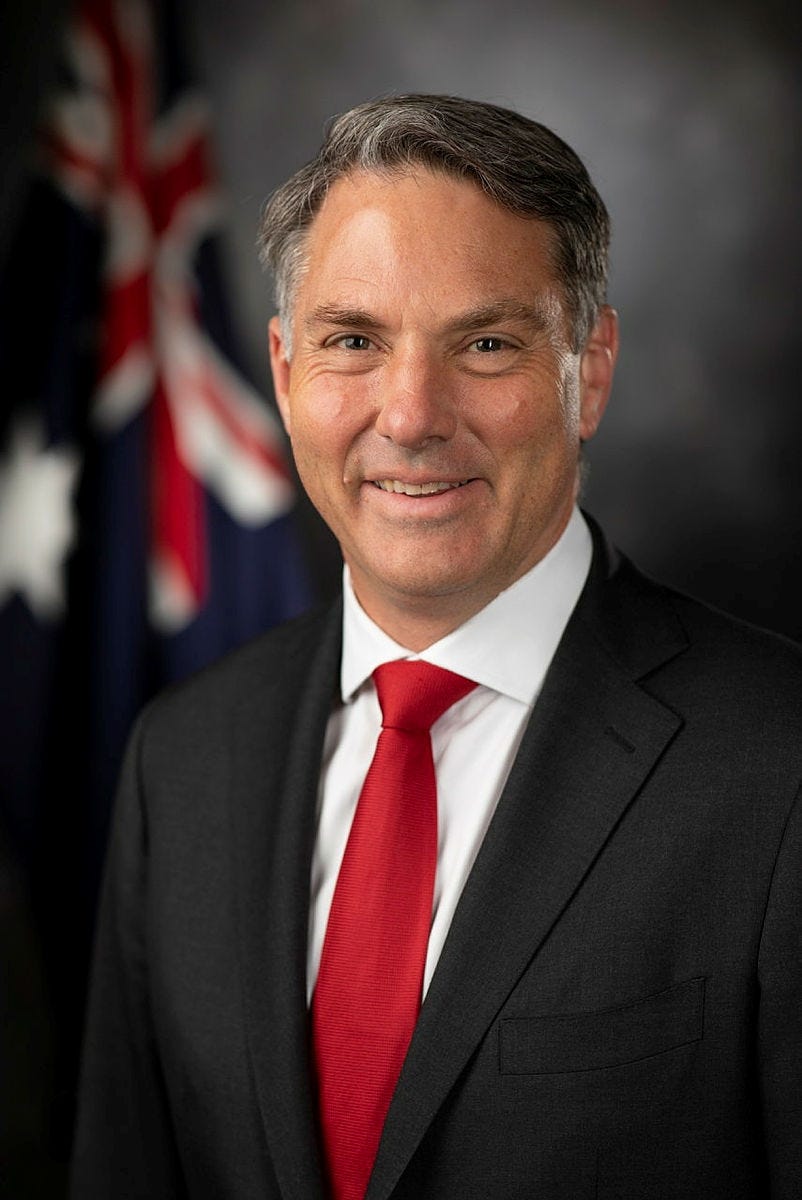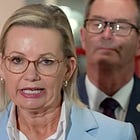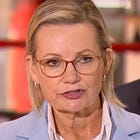Australia Eyes Critical Minerals Deal With US as China Supply Dispute Escalates
This piece is freely available to read. Become a paid subscriber today and help keep Mencari News financially afloat so that we can continue to pay our writers for their insight and expertise.
Today’s Article is brought to you by Empower your podcasting vision with a suite of creative solutions at your fingertips.
Australia is positioning itself as a key alternative supplier of critical minerals to the United States as Acting Prime Minister Richard Marles confirmed Canberra is exploring opportunities to “diversify” global supply chains currently dominated by Chinese processing, though he stopped short of endorsing full economic “decoupling” from Australia’s largest trading partner.
As trade tensions between the United States and China escalate over rare earth minerals and critical materials, Australia finds itself in an increasingly valuable strategic position—one that Acting Prime Minister Richard Marles indicated Thursday the government intends to leverage through closer cooperation with Washington ahead of Prime Minister Anthony Albanese’s White House visit next week.
In a carefully calibrated interview with ABC’s Afternoon Briefing, Marles outlined Australia’s approach to the intensifying critical minerals competition, emphasizing opportunities to build domestic processing industries while avoiding commitments that could fundamentally rupture economic ties with China, Australia’s largest trading partner.
“We see there is opportunity to be working with other countries around the world,” Marles said when asked about US Treasury Secretary Scott Bessent’s recent calls for allied nations to decouple from Chinese critical mineral supply chains. “We see there is opportunity and indeed a need to diversify the range of production and refinement activities beyond China.”
The comments come as the United States ramps up pressure on allies to reduce dependence on Chinese rare earth processing following Beijing’s announcement of export restrictions on several critical minerals used in defense manufacturing, electric vehicles, and advanced electronics. Bessent has called for coordinated action among G7 nations and Asian partners, framing Chinese control over mineral processing as a national security vulnerability.
Truth matters. Quality journalism costs.
Your subscription to Mencari directly funds the investigative reporting our democracy needs. For less than a coffee per week, you enable our journalists to uncover stories that powerful interests would rather keep hidden. There is no corporate influence involved. No compromises. Just honest journalism when we need it most.
Not ready to be paid subscribe, but appreciate the newsletter ? Grab us a beer or snag the exclusive ad spot at the top of next week's newsletter.
Australia, which possesses some of the world’s richest deposits of lithium, rare earths, and other critical minerals, has emerged as a prime candidate for expanded mining and processing operations that could reduce global reliance on Chinese refineries, which currently handle the vast majority of downstream mineral processing.
“It is to state the obvious that the vast bulk of processing, downstream processing that occurs in respect of critical minerals today happens in China,” Marles acknowledged. “And it is why we think there is a real opportunity for Australia to be in this sector, in the downstream processing of critical minerals.”
The Acting Prime Minister’s comments signal that critical minerals will feature prominently in discussions when Albanese meets with President Donald Trump in Washington next week—the first face-to-face meeting between the two leaders and a crucial opportunity to demonstrate the value of the Australia-US alliance amid Trump’s “America First” economic nationalism.
“We feel there is a lot of opportunity for us to be working with the United States to build that industry,” Marles said, while noting that Britain had also expressed interest in critical minerals partnerships during Albanese’s recent visit to London. “It is a really significant part of our economic relationship today with the United States.”
However, when pressed repeatedly on whether Australia would follow Bessent’s call for nations to actively decouple from Chinese mineral markets, Marles demurred, instead emphasizing Australian sovereignty in economic decision-making.
“At the end of the day, it is about building Australian industry and it’s obviously about acting in the Australian interest,” he said.
The delicate positioning reflects Australia’s persistent challenge of balancing security alignment with the United States against economic interdependence with China. Beijing accounts for roughly one-third of Australian exports, with iron ore, coal, and agricultural products forming the backbone of that trade relationship. Any move toward explicit decoupling could trigger Chinese economic retaliation, as occurred during the 2020-2021 trade disputes that saw Chinese import restrictions on Australian wine, barley, beef, and other products.
Yet strategic considerations are also driving Australian thinking. Marles emphasized that building critical minerals processing capacity domestically serves multiple objectives simultaneously—strengthening the Australian economy, contributing to allied supply chain resilience, and reducing vulnerability to Chinese economic coercion.
“We are very much proponents for building industry beyond China. We are proponents for building Australian industry in this sector, and that’s our focus,” he said.
The government points to existing Australian downstream operations, including some facilities located in third countries such as Malaysia, as evidence that diversification is already underway. But industry analysts note that truly competing with Chinese processing capabilities will require substantial capital investment, technological development, and guaranteed markets—all areas where US partnership could prove decisive.
The critical minerals discussion represents one element of a broader economic agenda likely to dominate the Albanese-Trump talks. Trade issues including potential US tariffs, the status of the AUKUS submarine partnership, and Australian defense spending levels are all expected to feature in negotiations.
Marles portrayed the defense relationship as proceeding smoothly despite months of media speculation about Trump administration concerns over Australian military expenditure. “All the milestones that need to be met are being met on time,” he said of AUKUS implementation. “This is a project which is happening at a pace and involves deep cooperation.”
The government has emphasized that Australia is undertaking “the biggest peacetime increase in Australia’s defence spending in our nation’s history,” with an additional $70 billion committed over the decade relative to previous projections—a figure Marles said is “well understood” by American counterparts.
On critical minerals specifically, Marles indicated the government views the opportunity as extending beyond bilateral US-Australia arrangements to potentially include broader frameworks involving other allied nations and partners in the Indo-Pacific region.
“We see there is opportunity to be working with other countries around the world,” he said, though he notably focused on the United States and United Kingdom when identifying specific partnership prospects.
Opposition Senate Leader Bridget McKenzie endorsed the government’s emphasis on critical minerals in the upcoming Trump meeting, calling it “a great opportunity.”
“The Coalition is focused on expanding our resources sector,” McKenzie told ABC’s Afternoon Briefing. “We know it’s a huge employer and particularly those critical mineral resources throughout our great country are going to be coming into significant focus and there is a competitive tension around where they land.”
She urged the government to use the visit to “land some deals and really strengthen our relationship with our greatest ally given the geostrategic challenges we face in this region.”
The challenge for Australian policymakers is navigating between American pressure for explicit anti-China alignment and Chinese sensitivity to any perception of economic containment—all while pursuing genuine national interest in building value-added mineral processing industries that could generate high-paying jobs and strategic leverage.
Marles’ formulation—emphasizing “diversification” rather than “decoupling”—represents the government’s attempt to thread that needle, presenting Australia as a reliable alternative supplier without overtly framing the relationship as part of anti-China coalition-building.
Whether that positioning proves sustainable as US-China tensions intensify remains an open question that may be partially answered by the outcomes of next week’s White House summit.
Sustaining Mencari Requires Your Support
Independent journalism costs money. Help us continue delivering in-depth investigations and unfiltered commentary on the world's real stories. Your financial contribution enables thorough investigative work and thoughtful analysis, all supported by a dedicated community committed to accuracy and transparency.
Subscribe today to unlock our full archive of investigative reporting and fearless analysis. Subscribing to independent media outlets represents more than just information consumption—it embodies a commitment to factual reporting.
As well as knowing you’re keeping Mencari (Australia) alive, you’ll also get:
Get breaking news AS IT HAPPENS - Gain instant access to our real-time coverage and analysis when major stories break, keeping you ahead of the curve
Unlock our COMPLETE content library - Enjoy unlimited access to every newsletter, podcast episode, and exclusive archive—all seamlessly available in your favorite podcast apps.
Join the conversation that matters - Be part of our vibrant community with full commenting privileges on all content, directly supporting The Evening Post (Australia)
Catch up on some of Mencari’s recent stories:
It only takes a minute to help us investigate fearlessly and expose lies and wrongdoing to hold power accountable. Thanks!








